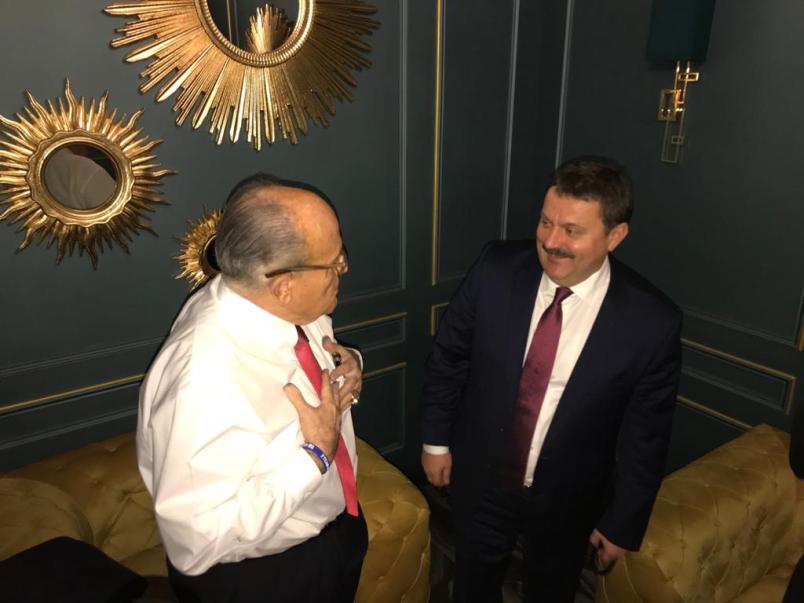Many of those who worked to interfere in American politics also played key roles in Russia’s assault on Ukraine — a fact that is becoming increasingly clear as the war moves into its second year and new intelligence becomes public.
Take a look at a new report released by RUSI, a British government-affiliated think tank which has done great work over the past year analyzing various aspects of the Russia-Ukraine war.
This report is devoted to “unconventional operations” — that is, the role of Russian spies in Ukraine. Thanks to the events of the past eight years, it’s a topic which has intersected with U.S. politics quite a bit. It also features new details regarding some Ukrainians who have cozied up to American political figures, and who have become TPM characters in the process.
Take Andrii Derkach, a former Ukrainian member of parliament who squired Rudy Giuliani around Kyiv in 2019. Derkach spent the run-up to the 2020 election spreading bizarre calumnies about alleged corruption involving President Biden in Ukraine, and also released supposed recordings of Biden speaking with Ukrainian officials while he was vice president.
Per the RUSI report, which says it relies on the results of a Ukrainian investigation, Derkach had been a Russian military intelligence asset since 2016.
The Ukrainian investigation found that Derkach received monthly payments of between $3 and $4 million from the GRU, Russia’s military intelligence agency, to create “a network of private security firms which would assist in maintaining control in a number of towns by pathfinding and assisting Russian forces upon their arrival.”
It’s not news that Derkach was likely a Russian agent — the U.S. government has also called him that.
But the level of detail is striking, and suggests that Derkach was on the payroll of Russian military intelligence at the same time that he fed Giuliani the dirt that he sought in Ukraine, and when a DHL shipping receipt appeared in the House Intelligence Committee suggesting that a package went from Derkach to the office of Rep. Devin Nunes (R-CA).
The RUSI report frames the work of these Russian agents as part of a broader effort to weaken Western support for Kyiv in the years before the invasion and since.
“Given Ukraine’s critical dependence on military-technical assistance from foreign partners, and above all assistance from the U.S., Russian special influence operations to worsen Ukraine’s relations with partner countries, and especially with the U.S., are a constant priority of the Russian special service,” the report reads.
The report also mentions a lesser-known but still important figure: a former employee of Paul Manafort’s named Vladimir Sivkovych.
Manafort associate Rick Gates testified at his former boss’s 2018 trial that Sivkovych worked with the two of them, and the Treasury Department sanctioned Sivkovych weeks before Russia’s full-scale invasion.
Like Derkach, Sivkovych purportedly played a role in Russia’s pre-invasion plans, albeit from Moscow.
Sivkovych, the report says, was tasked with pressing Ukrainian officials to drop the country’s NATO ambitions before Russia’s invasion — part of a scheme intended to stoke mass protests and allow Russia to use the instability as an entrance point.
Most of these efforts failed, leaving Russian authorities struggling to justify the full-scale invasion in February 2022. Russia was surprised to find Ukraine united, and Ukrainian forces ripped through the Russian army, partly setting the stage for the grinding, positional warfare that defines the conflict today.
Much of the attention in recent weeks has focused on the eastern city of Bakhmut, which Ukraine has continued to hold after months of horrific battles.
Another figure who interfered in American politics — mercenary leader Yevgeny Prigozhin — has been responsible for the Russian assault on Bakhmut, deploying his mercenary group Wagner PMC (yes, it’s named after the German composer who was a favorite of the Nazis) and staffing it with prisoner conscripts, who are used as cannon fodder.
Prigozhin said in an audio recording that he released on Wednesday that the fighting in Bakhmut had nearly destroyed his mercenary outfit.
“The battle for Bakhmut today has already practically destroyed the Ukrainian Army, and unfortunately, it has also badly damaged the Wagner Private Military Company,” he said. “If PMC Wagner dies in the Bakhmut meat grinder and takes with it the Ukrainian armed forces and its assigned forces with foreign arms, and gives the Russian army the opportunity to go further in defending the interests of Russia, then we will have fulfilled our historical role.”


 Members-Only Article
Members-Only Article
